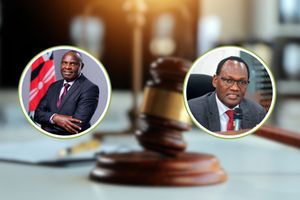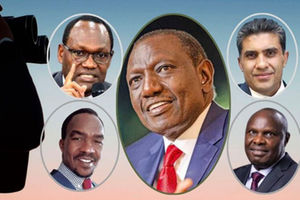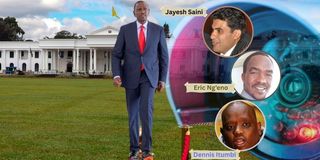
Court filings have exposed a bitter falling-out among State House aides.
Court filings have exposed a bitter falling-out among State House aides, a chaotic communication strategy and how President William Ruto’s frustration by his government losing public appeal prompted the search for a controversial spying software.
Ms Mary Wachuka, who has sued four of President Ruto’s men seeking compensation for the botched procurement of a digital propaganda system, has filed private communication with one of the President’s aides, lifting the lid on the power struggle at State House.
Ms Wachuka, a Kenyan-Canadian citizen, says between November 10, 2023 and July 21, 2024, she had extensive discussions—both in-person and virtually—with senior State officials, including Mr Eric Ng’eno, the President’s speech writer, regarding the proposed software.
In court papers, she claims that Mr Ng’eno informed her that the President had “expressly sought a tailored digital communication solution in light of increasing concern over the fragmented and often counterproductive messaging of the administration’s agenda”.
On Tuesday, Ms Wachuka filed a response opposing an application by two defendants — Head of Public Service Felix Koskei and Treasury Principal Secretary Chris Kiptoo — to be excused from the court proceedings.
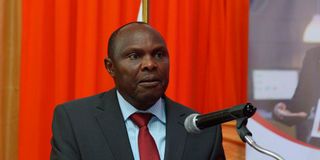
Chief of Staff and Head of Public Service Felix Koskei.
The other defendant is businessman Jayesh Saini. The Attorney-General has also been sued.
Ms Wachuka and her company, Jipe Inc, have sued Mr Koskei, Mr Kiptoo, Mr Jayesh and Mr Ng’eno for breach of contract. She is seeking compensation totalling Sh119 million for the breach of contract and an additional Sh170 million as compensation for losses incurred after the collapse of the deal.
In her court filings, Ms Wachuka cites a WhatsApp conversation on December 18, 2023, in which she says Mr Ng’eno explained that the communication landscape had become chaotic, with Mr Denis Itumbi “hijacking the government messaging apparatus and making himself the focal point”.
She adds that Mr Ng’eno stated that Mr Jayesh had not been part of the formal campaign structure, but had leveraged his financial contributions and relationships “to insert himself into the core messaging space, resulting in internal disarray and reputational risk”.
According to her, Mr Ng’eno observed that Mr Itumbi’s influence had forced the government into a reactive stance, with Azimio la Umoja One Kenya, then led by Mr Raila Odinga, appearing more disciplined and effective.
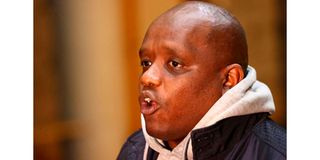
Dennis Itumbi.
“To quote from Ng’eno’s own message: ‘He wasn’t managing the campaign, thankfully. He was supporting through his own and others’ financial donations. He (Mr Jayesh) got into the messaging space because Azimio were eating us up ... Itumbi was out of control and making himself the focal point ... It’s embarrassing’,” Ms Wachuka says in the court papers.
According to her, Mr Ng’eno attributed part of the urgency in developing a more coherent and professional solution “to this internal breakdown”.
She says that Mr Ng’eno, who introduced himself as an emissary of the President, expressly assured her that funding for the project would come from the confidential vote administered by the National Treasury.
Earlier, she says, Mr Ng’eno had on November 22, 2023, arranged a meeting between her and Mr Jayesh, whom Mr Ng’eno, she says, had previously described as “the regime’s financier and oligarch”.
At this first meeting, Ms Wachuka claims Mr Jayesh confirmed this role himself and spoke at length about the administration’s difficulties with information control and digital communication. Also present was Mr Jayesh’s assistant, Nishant.
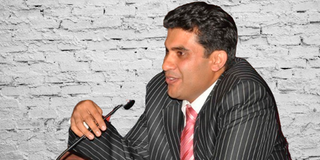
Businessman Jayesh Umesh Saini.
“He claimed that two Indian developers he had earlier hired to create a similar system were “eliminated” under the previous regime, and expressed gratitude that Eric had finally found a local solution,” Ms Wachuka quotes Mr Jayesh.
He was referring to Mohamed Zaid Sami and Zulfikaq Ahmed Khan who had come into the country in 2022 to help then Deputy President Ruto’s presidential campaign. They were abducted on July 22 and 23, and it’s believed they were murdered by State agents. Some officers from an elite police squad that was disbanded by President Ruto once he assumed office have been charged over their murders.
“Jayesh further disclosed that the President had rejected a proposal to purchase one of the major newspapers for use as a propaganda outlet, and instead approved software as a more effective alternative,” she says.
According to Ms Wachuka, at the conclusion of the nearly two-hour meeting, Mr Jayesh indicated “that the software would form the core of their strategy to gain control of the digital narrative”.
Ms Wachuka says that at Mr Jayesh’s instruction, Nishant demonstrated their existing digital setup.
“Using two iPhones and a laptop, he logged into the President’s Twitter and Facebook accounts and showed me the laborious process of manually deleting critical comments. He then revealed an Excel spreadsheet showing 11 accounts managed from India, used to post supportive comments under the President’s content,” she says in court papers.
After leaving the meeting, Ms Wachuka says she privately expressed to Mr Ng’eno her reluctance to have Mr Jayesh lead the project and threatened to withdraw. She says Mr Ng’eno urged patience and assured her he would speak directly with both the President and Mr Jayesh to resolve the leadership issues.

Mr Eric Ng'eno, President William Ruto's speech writer.
According to Ms Wachuka, Mr Ng’eno told her on December 5, 2023, that he had spoken to Mr Jayesh during a State visit in India.
“He advised that he was trying to bargain and he told Jayesh that one thing he cannot afford was to allow me to walk away and not my fee. Eric further stated that Jayesh agreed to present the budget of the software to the President and that Eric would reinforce his pitch,” she says, attaching screenshots of the WhatsApp conversations.
However, on December 12, 2023, tensions escalated and Mr Ng’eno and Mr Jayesh had a falling-out, with each blaming the other for delays, according to Ms Wachuka. So bad was the situation that Mr Ng’eno went on a rant describing Mr Jayesh in unflattering language.
She says Mr Ng’eno sent her multiple messages, in which he criticised Mr Jayesh’s “arrogance, his proximity to the President, and even admitted to plans to oversell the software, retain the overheads, or replicate the system and present it as his own”.
“I will call him directly and tell him what I think of him. He told me there is no need to get emotional. He is just pretending to be savvy and complex and authoritative ... I am so angry,” Ms Wachuka quotes Mr Ng’eno. “... he had offered a troll farm concept that was basically Nishant and his few devices, the charade enabled him to take credit for others’ work, it’s embarrassing.”
“His entire strategy is visibility, apparent utility and proximity. I fell for it, I assumed his visibility was a product of merit, not graft,” Ms Wachuka recounts Mr Ng’eno telling her.
Following the fallout, Mr Ng’eno decided to bypass Mr Jayesh and engage the President directly. Ms Wachuka says he subsequently informed her that the President had approved the project, confirmed that the budget was viable and would be sourced from confidential government funds.
She adds that Mr Ng’eno told her the President had directed him to proceed with immediate implementation.
To dispute claims that there was no binding contract, as stated by Dr Kiptoo, Ms Wachuka argues that through the authorised officer, Director-General of Public Investments and Portfolio Management Lawrence Kibet, the government directly negotiated and approved budgetary allocation. She cites a meeting with him at Treasury building, in the presence of Mr Ng’eno, where he confirmed the government’s readiness to fund the project.
Ms Wachuka says immediately after receiving verbal confirmation of approval, Mr Ng’eno, herself and designated third-party contractors held a conference call to plan technical aspects of the system and integrate additional components.
“During the said call, Mr Ng’eno disclosed that he had received further instructions from the President to incorporate aggressive digital offensive features into the system. On the call, he provided a detailed list of political and civil society targets, accompanied by operational instructions for each,” Ms Wachuka says.
On December 29, 2023, Ms Wachuka says Mr Ng’eno sent her another WhatsApp message: “Principals are eager and able— Treasury has ring-fenced funds —get ready to get your gig on the road.”
But by January 31, 2024, the first signs that all was not well started showing. Ms Wachuka, who had subcontracted a US-based company—TESXO—to help with the work, paid a down payment of $276,000 (Sh38 million). She would later pay an additional $12,000 (Sh1.6 million) fine for late payment.
Eventually, Ms Wachuka sold her house in Canada to pay TESXO.
On July 26, 2024, Ms Wachuka says, Mr Ng’eno requested for a face-to-face meeting with her in Nairobi.
After the meeting and with no money forthcoming, Ms Wachuka says she started receiving anonymous death threats through her email and telephone. It was now evident that the deal had collapsed.
On August 5, 2024, Ms Wachuka and her lawyer, Daniel Kanchori, visited State House in a final attempt to find a solution to the impasse. Others present at the meeting were State House Comptroller Katoo Ole Metito, State House Spokesperson Mohammed Hussein and other senior officials.
Ms Wachuka says the State House officials confirmed they had seen her demand letter, but stated they were not familiar with the full details of the matter.
Ms Wachuka was asked to provide the details of the project.
Another round of the fight started when the President’s private secretary, Reuben Maiyo, called Mr Jayesh and placed him on speakerphone, according to Ms Wachuka’s filings.
Mr Maiyo wanted to know what role Mr Jayesh had played. Ms Wachuka says Mr Jayesh acknowledged having been part of the software project and that he had stepped aside due to the costs of the project.
Ms Wachuka says she pleaded with Mr Hussein to intervene and stop the death threats she was receiving.
Mr Hussein, Ms Wachuka alleges, responded with a dismissive wave of the hand, then asked her whether she was in a position to disclose the names of international organisations allegedly funding the Gen Z movement.
She says she told Mr Hussein that she was not sure who was funding the protests.
Mr Metito, Ms Wachuka says, then called Mr Ng’eno’s supervisor, Mr Emmanuel Tallam, who was also placed on speakerphone.
Ms Wachuka says Mr Tallam confirmed that he had seen the demand letter by Ms Wachuka and had attempted to seek clarity from Mr Ng’eno.
A week later, Ms Wachuka says, she received feedback from State House officials confirming that they had spoken with Mr Ng’eno, who, she says, admitted to having been involved in the project.
The officials advised Ms Wachuka to sue Mr Ng’eno individually. However, she sued the four and the Attorney-General.
The defendants have denied any role in the saga and have asked the court to dismiss Ms Wachuka’s petition, arguing that she was pursuing an unconstitutional project.


